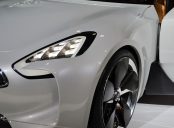Volkswagen, also known as VW, is a German automotive manufacturer that has had a significant impact on the global automobile industry

With a history dating back to 1937, VW has become synonymous with quality, innovation, and iconic designs. In this article, we will delve into the rich history of VW, its evolution over time, and why it continues to capture the interest of car owners and enthusiasts worldwide.
Introduction to Volkswagen (VW)
Volkswagen is one of the largest automobile manufacturers in the world, with a wide range of vehicles catering to various market segments. The company’s headquarters is located in Wolfsburg, Lower Saxony, Germany. VW produces cars, commercial vehicles, and motorcycles under various brand names such as Volkswagen, Audi, Seat, Skoda, Lamborghini, and Porsche.
VW is known for its commitment to engineering excellence, safety, and environmental sustainability. The brand’s tagline, “Das Auto,” reflects its aspirations to create vehicles that are not only reliable and efficient but also enjoyable to drive.
Historical Overview of VW

The roots of VW can be traced back to the late 1930s when the German Labour Front, a Nazi-controlled organization, commissioned Ferdinand Porsche to design an affordable and practical car for the masses. This marked the birth of the legendary Volkswagen Beetle, which would later become an automotive icon.
However, the true rise of VW came after World War II when the British Army took control of the bombed-out Wolfsburg factory and revived production. In the post-war era, the Beetle gained popularity due to its affordability, reliability, and distinctive design. It became a symbol of Germany’s economic recovery and captured the hearts of people worldwide.
Over the years, VW expanded its product portfolio to include various models such as the Golf, Passat, Polo, Jetta, and Tiguan. Each of these vehicles has contributed to VW’s success and has earned a loyal following among consumers.
In the late 20th century, VW faced challenges and changes in ownership. The company went through a phase of mergers and acquisitions, ultimately becoming part of the Volkswagen Group in 1964. Under the leadership of the group, VW experienced tremendous growth and went on to become a global powerhouse.
VW’s Commitment to Innovation
VW has always been at the forefront of automotive innovation, constantly pushing the boundaries of technology and design. The company has made significant contributions to the industry in terms of safety features, drivetrain technology, and environmental sustainability.
In recent years, VW has made substantial investments in electric mobility, aiming to become a leader in the transition to sustainable transportation. The introduction of the ID range, featuring all-electric models like the ID.3 and ID.4, showcases VW’s commitment to a greener future.
Structured Text to Improve Featured Snippet Opportunities:
– Introduction to Volkswagen (VW)
– Historical Overview of VW:
– Birth of the Volkswagen Beetle in the 1930s
– Revival and post-war popularity of the Beetle
– Expansion of VW’s product portfolio
– Challenges and changes in ownership
– VW’s Commitment to Innovation:
– Safety features and technological advancements
– Contribution to electric mobility
–
VW’s Impact on the Global Automobile Industry
–
Conclusion
VW’s Impact on the Global Automobile Industry
VW’s influence extends beyond its own product range, as the company has played a significant role in shaping the global automobile industry. The success of the Beetle inspired other automakers to develop their own small and affordable cars, leading to the introduction of iconic models like the Fiat 500 and Mini Cooper.
Furthermore, VW’s commitment to technological advancements has set new standards for the industry. Features such as Anti-lock Braking Systems (ABS), Electronic Stability Control (ESC), and advanced infotainment systems have all become norms in modern cars, largely due to VW’s pioneering efforts.
VW has also been actively involved in motorsports, with notable achievements in events such as the Dakar Rally and the World Rally Championship. These endeavors not only showcase the brand’s engineering capabilities but also contribute to its image as a manufacturer of performance-oriented vehicles.
Conclusion
VW’s rich history, commitment to innovation, and impact on the global automobile industry make it a fascinating subject for car owners and enthusiasts. From the humble beginnings of the Beetle to the present-day electric revolution, VW continues to evolve and push the boundaries of automotive excellence.
Whether you appreciate VW for its iconic designs, technological advancements, or environmental sustainability efforts, there is no denying the brand’s enduring appeal. The future looks promising for VW as it embraces new technologies and continues to create vehicles that captivate and inspire.





















